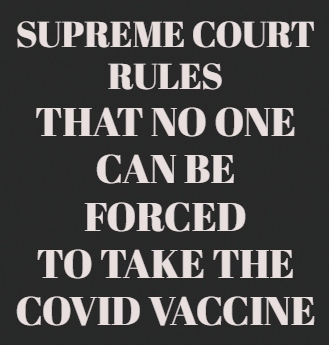

By Sunil Garodia
First publised on 2022-05-02 10:36:28
In a landmark decision, the Supreme Court today said that the government cannot force anyone to take vaccine shots as that was against the right to life and personal liberty enshrined in Article 21 of the Indian constitution. "Bodily integrity is protected under the law and nobody can be forced to be vaccinated," the court said. It said that the restrictions imposed on individuals through vaccine mandates cannot be said to be proportionate. It asked the Centre and state governments to call back all orders restricting access to public spaces or amenities and welfare schemes for the unvaccinated. It also said that the government must publicize the adverse effects of vaccines and put all trial data in public domain.
Here it is important to note that while the vaccine drive in India is voluntary, the Centre and many state governments and their departments had imposed several restrictions on the unvaccinated. These included denying entry in public places and public transport, stopping of access to welfare schemes and in some cases even denial of crediting of salary to government staff. This amounted to coercion and a person who did not wish to be vaccinated had to take the jab to avail these services. The Supreme Court order will now change all that. But the court has also said that this is to be maintained when cases are low, as they are now, which means that if there is a surge in cases, the government can bring back the restrictions in public interest. The court said that "certain limitations on individual rights" could be imposed in the interest of community health.
The Centre argued that any such order will increase vaccine hesitancy (it must be noted that only 1% adults up to the age of 60 have taken the booster dose in India) and some state government also argued that such restrictions were necessary for the safety of all citizens, especially those using public spaces and transport, but the court thought otherwise. While the court has rightly considered Article 21 as the benchmark in deciding the case, it needs to be stated that in case of events like a pandemic it is better to think of the benefit of the entire community. Individuals have the right to take an informed decision for their benefit but in times of a pandemic, their rights must be placed under limitations if the health of the entire community is threatened by their decision.











